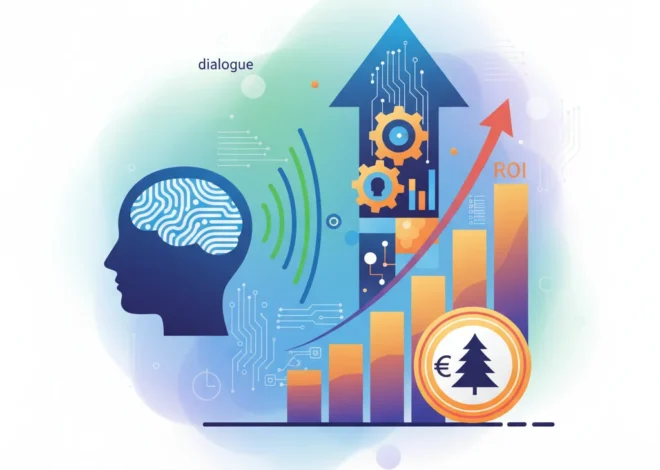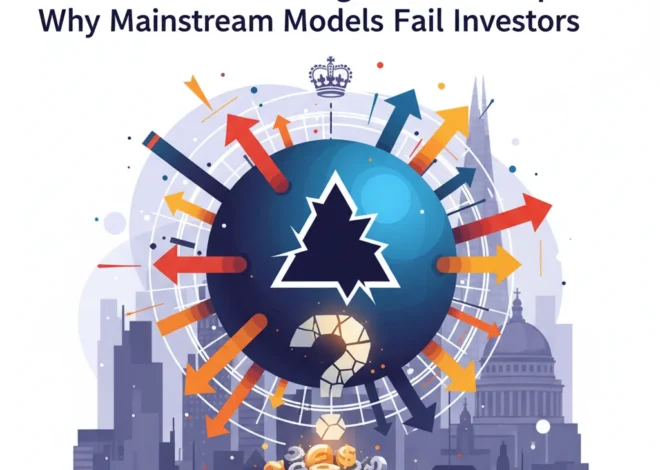
The £1 Breakfast: A Surprising Masterclass in Social Impact Investing and Economic Resilience
In the fast-paced world of high finance, the term “investment” conjures images of stock market tickers, complex derivatives, and venture capital funding rounds aiming for exponential growth. We obsess over quarterly earnings, algorithmic trading, and the disruptive potential of financial technology. But what if one of the most powerful and insightful case studies in modern economics isn’t found on a blockchain ledger or in a Wall Street prospectus, but over a £1 plate of scrambled eggs in a local nursery?
A recent initiative at a nursery in the UK has inadvertently provided a profound lesson for investors, business leaders, and economists alike. The establishment, Little Pioneers Nursery, launched a breakfast club not for the children, but for their parents. For the nominal fee of £1, adults can enjoy a hot meal and a cup of tea in a warm space, with the primary goal of helping them connect and build friendships. According to the BBC report, the simple act is designed to combat the social isolation that can often accompany early parenthood. While this may seem like a heartwarming community story, viewing it through the lens of finance and economics reveals a sophisticated model of micro-investment with the potential for staggering macro-level returns.
The Economics of Social Capital: An Untraded Asset with Unparalleled Value
Traditional economics and finance excel at quantifying tangible assets. We can price a stock, value a company, or forecast a nation’s GDP. Where the models often fall short is in valuing “social capital”—the networks of relationships among people who live and work in a particular society, enabling that society to function effectively. Trust, reciprocity, and social cohesion are not line items on a balance sheet, yet their absence creates immense economic drag, while their presence acts as a powerful economic lubricant.
Parental loneliness is not just a social issue; it’s an economic one. A study by the Co-op and the British Red Cross found that loneliness can cost UK employers £2.5 billion every year through factors like lost productivity, increased sick days, and higher employee turnover. By investing a minimal amount in subsidized hot meals, the nursery is directly manufacturing social capital. It is creating a low-friction environment for parents to build support networks, share resources, and reduce the mental and emotional load of parenting. This, in turn, makes them more resilient, focused, and productive members of the workforce. It’s a direct, albeit small, injection of stimulus into the local economy’s human infrastructure.
Redefining ROI: A Look at the Social Return on Investment (SROI)
For any finance professional, the immediate question is: What is the return on investment (ROI)? In purely financial terms, a £1 breakfast club is a loss leader. But that’s a failure of the metric, not the initiative. This is where the concept of Social Return on Investment (SROI) provides a more holistic framework. SROI attempts to measure the wider economic, social, and environmental value created by an investment.
Let’s analyze the nursery’s project as a portfolio manager would analyze an asset. The initial capital outlay is minimal—the cost of ingredients and energy, subsidized by the parent company. The returns, however, are diverse and compound over time. They include improved mental health for parents (reducing long-term strain on public healthcare services), stronger community ties (increasing local resilience and safety), and the creation of informal childcare or support networks (freeing up parents for economic activity). A 2019 report on the value of community hubs highlighted that for every £1 invested, they can generate an average of £4 in social value. The nursery’s breakfast club functions as a micro-hub, likely generating returns in a similar, if not greater, proportion.
To illustrate the contrast between traditional financial metrics and a social value framework, consider the following comparison:
| Metric | Traditional Stock Market Investment | Social Capital Investment (e.g., Breakfast Club) |
|---|---|---|
| Primary Goal | Financial profit, capital appreciation | Social cohesion, improved well-being, economic stability |
| Key Performance Indicators (KPIs) | Share price, P/E ratio, dividend yield | Reduced social isolation, improved mental health metrics, increased community engagement |
| Risk Profile | Market volatility, economic downturns, competition | Low financial risk; primary risk is lack of engagement |
| Return Type | Primarily financial (capital gains, dividends) | Blended: Social (stronger community), Economic (reduced healthcare costs, higher productivity), Financial (indirectly boosts local economy) |
| Time Horizon | Can be short-term (trading) or long-term | Inherently long-term, with compounding social benefits |
Scaling Impact: The Role of Banking and Financial Technology
While a single breakfast club is impactful, the real question for business leaders and investors is scalability. How can we replicate this model thousands of times over? This is where modern banking and financial technology (fintech) can play a transformative role.
Imagine a fintech platform dedicated to corporate social responsibility (CSR) or ESG investing. Companies could use the platform to directly fund and monitor hyperlocal projects like this, receiving detailed reports on the SROI their investment generates. Neobanks could offer specialized accounts for non-profits and community groups, eliminating fees and providing tools to manage donations and grants efficiently. We could even see the tokenization of social impact, where a blockchain-based system provides complete transparency for donors, showing exactly how their £1 contribution was used to purchase a meal, with the resulting social metrics recorded immutably on a distributed ledger. This isn’t science fiction; it’s the logical application of powerful financial technology to solve real-world problems.
This approach moves beyond traditional philanthropy, which is often disconnected and inefficient, and towards a model of precise, data-driven social investing. It allows capital to be allocated with the same rigor as a trading algorithm, but with the goal of building a more resilient and equitable economy from the ground up.
Beyond the Bonus: Why ANZ's Million Pay Cut Signals a New Era for Banking Accountability
A Portfolio Approach to a Better Economy
This is not an argument to abandon the stock market or traditional financial instruments. A healthy economy requires robust capital markets for innovation and growth. However, it is a call for a more balanced and diversified understanding of what constitutes a valuable “investment.” The volatility of the stock market, driven by everything from geopolitical events to fleeting social media trends, stands in stark contrast to the stable, long-term value created by strengthening a community.
For business leaders, the lesson is that investing in the well-being of your employees’ communities is a direct investment in your own workforce’s stability and productivity. For investors, it highlights the growing importance of the “S” in ESG—and the untapped opportunities in funding initiatives that generate both social and economic returns. For policymakers, it’s a clear signal that some of the most effective economic stimulus packages don’t come from central banking, but from enabling and empowering community-level organizations.
The humble £1 breakfast club at Little Pioneers Nursery is more than just a nice gesture. It is a microcosm of a more sustainable and resilient economic model. It teaches us that the principles of finance and economics are not just abstract theories; they are tools that can be used to build stronger communities, foster human connection, and ultimately, generate a form of wealth that no stock market can ever truly measure.
By shifting a fraction of our focus from pure financial extraction to holistic value creation, we can build a more robust and prosperous society for everyone. It’s a strategy that pays dividends in the form of stronger communities, healthier citizens, and a more stable economy—a return on investment that is, quite frankly, priceless.


